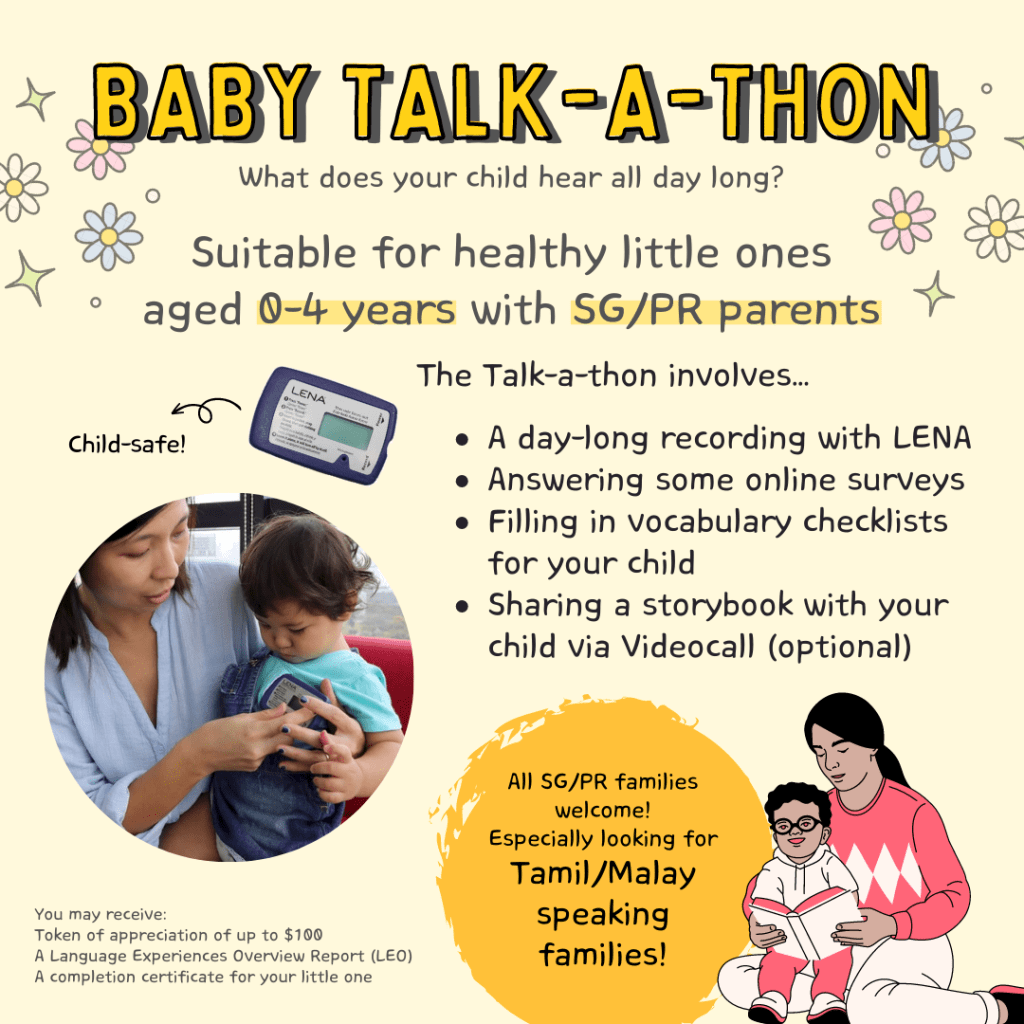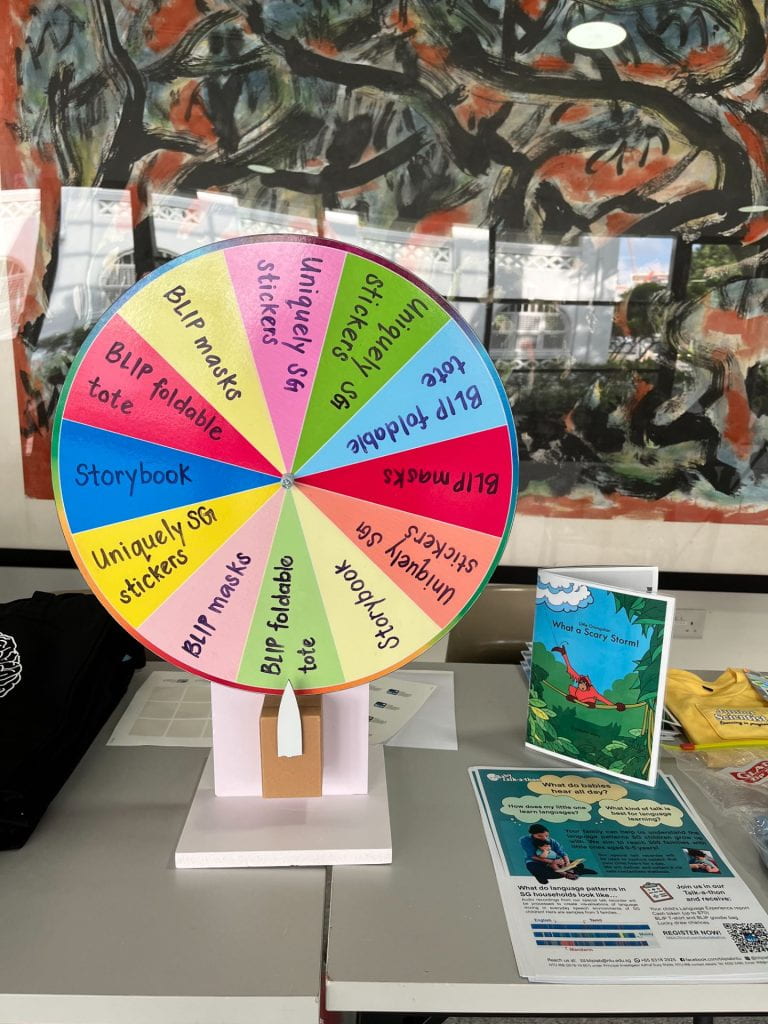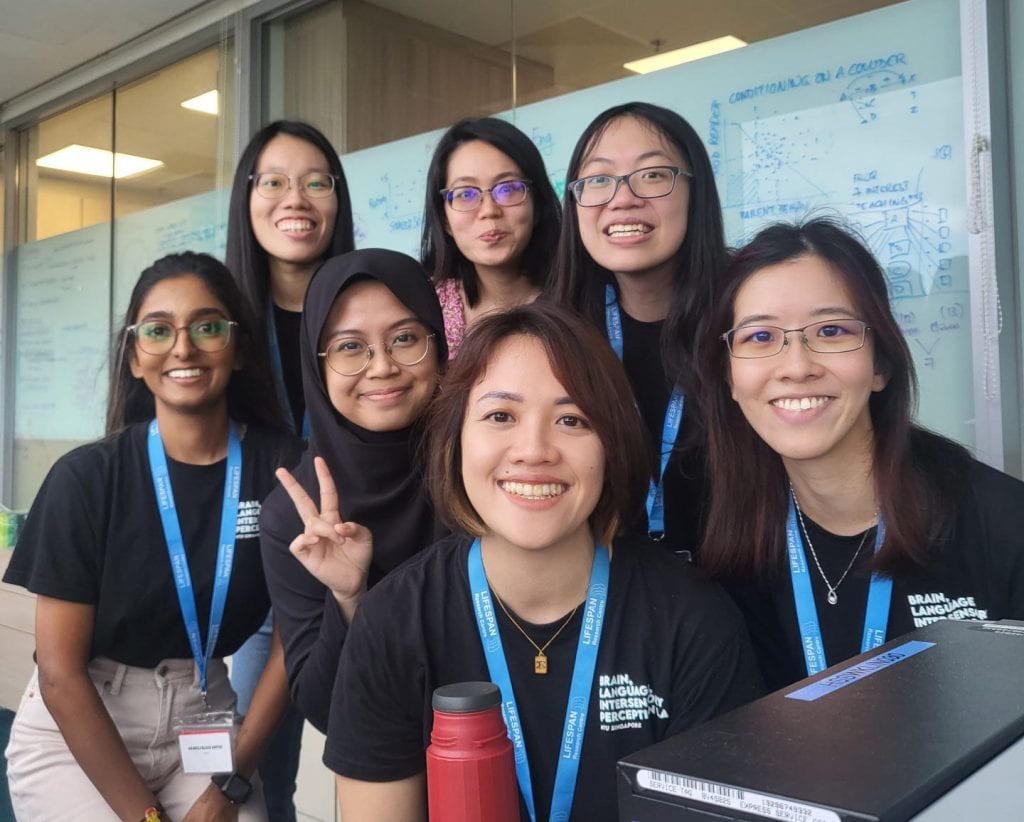Baby Talk-a-thon: What do babies hear all day?
This year, we kick-started the Baby Talk-a-thon, a study that aims to understand more about the speech that Singaporean babies hear in their day-to-day lives. We want to know what the speech environment is like for our little ones here in Singapore! Language scientists around the world are discovering that the kind of speech babies hear in their first 3 years makes a big contribution to early language development and how well kids do in school later on. However, at the moment, almost all of the information we have comes from one country (the USA) and one language (English). Our language landscape is very interesting, with lots of different languages, and lots of different language combinations in different families. The talk-a-thon will help us discover more about Singapore, and what strategies are the most helpful for Singaporean families.
So far, more than 100 families from Malay, Mandarin, and Tamil speaking families, all of whom also speak English, have signed up for our Baby Talk-a-thon and we’ve gathered over 1000 hours’ worth of recordings. This will help us to understand much of baby’s daily talk comes from which of the household’s languages, and the language mixes differ between different homes. We’d like to thank all mummies and daddies and especially the little ones for participating in our study!
The Family Name game: How do you call people in your family to your child?
Here in Singapore, some of babies’ first words are special red-dot words – this is what makes baby-talk in this part of the world special! The Red-Dot Words is a set of studies designed to help us to understand how people in Singapore use different kinds of words when they are at home. This helps us to find out more about the way Singapore’s children learn language in the preschool years. Previously, we asked people all over the country when they think children start learning these words and how these words are used. In the Family Name game, we want to hear the words parents use when talking about – or talking to – the people their little one sees regularly.
Link to the Family Name game: https://ntusingapore.qualtrics.com/jfe/form/SV_6WgBjxXcjSM3IvI
Our Bilingual Futures: A series of talks about the science of raising bilingual children in Singapore
In the first session of Our Bilingual Futures, we hosted a series of talks and a follow-up Q&A session focusing on the science of raising bilingual children in a multilingual Singapore. Our expert panelists, Dr Suzy Styles (NTU), Dr Beth O’Brien (NIE), and Dr Annabel Chen (NTU) gave insightful talks about the shifting language environment in Singapore, the role of reading in children’s language development, as well as neurological processes and brain areas involved when we are reading. Attendees also received goodie bags and had the opportunity to visit the labs’ booths located outside the auditorium where they learnt about our ongoing studies. We even had a spin-the-wheel game and a lucky draw! Click here to read more about Our Bilingual Futures (The Science of Raising Bilingual Children): https://blogs.ntu.edu.sg/blip/our-bilingual-futures/
The second session was targeted towards families with children of an older age group – our expert panelists used examples from existing studies that looked at kindergarten children to talk about language development and how parents can use more than one language to foster bilingualism in their little ones. Click here to read more about Our Bilingual Futures (Achieving Bilingual Outcomes): https://blogs.ntu.edu.sg/blip/our-bilingual-futures-achieving-bilingual-outcomes/
We’ve also included the video recordings of the talks and Q&A sessions as well as the transcripts in the links above!
MERLIon CCS Challenge: Developing robust language identification and language diarization systems for non-standard, accented, spontaneous code-switched, child-directed speech

In other exciting news, BLIP Lab was pre-selected to host a special session for the INTERSPEECH 2023 conference! Aligning closely with the conference’s theme, we presented the challenge of developing robust language identification and language diarization systems that are reliable for non-standard accented, bilingual, child-directed speech collected via a videocall platform. The MERLIon CCS Challenge aimed to tackle automatic language identification and language diarization in a unique first-of-its-kind Zoom videocall dataset: a subset of audio recordings from our Talk Together Study, where parents narrated an onscreen wordless picturebook to their child. Three teams who participated in our challenge managed to beat our baseline system, improving our understanding on building robust systems for language identification for complex speech environments. The INTERSPEECH 2023 special session was held in August, where the three teams presented their winning system.
Read about the tasks and their results (https://arxiv.org/abs/2305.18881) and find out what type of speech characteristics systems collectively struggle with (https://arxiv.org/abs/2305.18925).
We’re excited to see what the new year brings us! BLIP Lab would like to once again thank everyone who has taken part in our studies. We hope to see you soon for more exciting things! Happy holidays and a joyful new year to you and your loved ones 😀
Follow our Facebook page: www.facebook.com/bliplabntu
We’re also on Instagram @bliplabntu!








